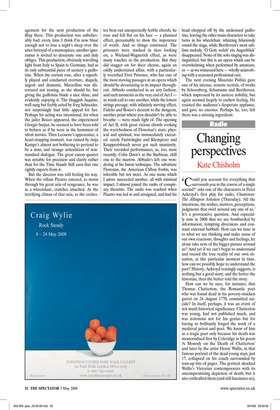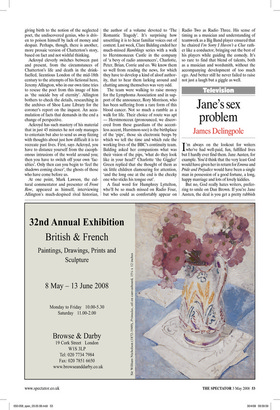Changing perspectives
Kate Chisholm
‘Could you account for everything that surrounds you in the course of a single second?’ asks one of the characters in Peter Ackroyd’s first play for radio, Chatterton: The Allington Solution (Thursday). ‘All the intentions, the wishes, motives, perceptions, judgments that swirl around any one of us.’ It’s a provocative question. And especially now in 2008 that we are bombarded by information, tempting diversions and constant external hubbub. How can we tune in to what we are thinking and make sense of our own reactions, thoughts and feelings, let alone take note of the bigger picture around us? And yet if we can’t begin to understand and record the true reality of our own situation, at this particular moment in time, how can we possibly hope to understand the past? History, Ackroyd teasingly suggests, is nothing but a good story; and the better the historian, then the better told the story.
How can we be sure, for instance, that Thomas Chatterton, the Romantic poet who was found dead in his poverty-stricken garret on 24 August 1770, committed suicide? In itself, perhaps, it was an event of not much historical significance. Chatterton was young, had not published much, and was notorious not for his genius but for having so brilliantly forged the work of a medieval priest and poet. We know of him as a tragic poet only because his death was memorialised first by Coleridge in his poem ‘A Monody on the Death of Chatterton’ and later by the artist Henry Wallis, in that famous portrait of the dead young man, just 17, collapsed on his couch surrounded by torn-up bits of paper. The portrait shocked Wallis’s Victorian contemporaries with its uncompromising depiction of death, but it also enthralled them (and still fascinates us), giving birth to the notion of the neglected poet, the undiscovered genius, who is driven to poison himself by lack of money and despair. Perhaps, though, there is another, more prosaic version of Chatterton’s story, based on fact and not wishful thinking.
Ackroyd cleverly switches between past and present, from the circumstances of Chatterton’s life and death in the drinkfuelled, licentious London of the mid-18th century to the attempts of his fictional hero, Jeremy Allington, who in our own time tries to rescue the poet from this image of him as ‘the suicide boy of eternity’. Allington bothers to check the details, researching in the archives of Shoe Lane Library for the coroner’s report on the inquest. An accumulation of facts that demands in the end a change of perspective.
Ackroyd has such mastery of his material that in just 45 minutes he not only manages to entertain but also to send us away fizzing with thoughts about just how difficult it is to recreate past lives. First, says Ackroyd, you have to distance yourself from the cacophonous intrusions of the world around you; then you have to switch off your own ‘faculties’. Only then can you begin to ‘feel the shadows coming closer’, the ghosts of those who have come before us.
At one point, Mark Lawson, the cultural commentator and presenter of Front 1/2 the author of a volume devoted to ‘The Romantic Tragedy’. It’s surprising how unsettling it is to hear familiar voices out of context. Last week, Clare Balding ended her much-missed Ramblings series with a walk to Herstmonceux Castle in the company of ‘a bevy of radio announcers’, Charlotte, Peter, Brian, Corrie and co. We know them so well from reading the news, for which they have to develop a kind of aloof authority, that to hear them larking around and chatting among themselves was very odd.
The team were walking to raise money for the Lymphoma Association and in support of the announcer, Rory Morrison, who has been suffering from a rare form of this blood cancer. Not so much a ramble as a walk for life. Their choice of route was apt — Herstmonceux (pronounced, we discovered from these guardians of the accentless accent, Hurstmon-soo) is the birthplace of the ‘pips’, those six electronic beeps by which we tell the time and which rule the working lives of the BBC’s continuity team. Balding asked her companions what was their vision of the pips, ‘what do they look like in your head?’ Charlotte ‘the Giggler’ Green replied that she thought of them as six little children clamouring for attention, ‘and the long one at the end is the cheeky one who sticks his tongue out’.
A final word for Humphrey Lyttelton, who’ll be so much missed on Radio Four, but who could as comfortably appear on Radio Two as Radio Three. His sense of timing as a musician and understanding of teamwork as a Big Band player ensured that he chaired I’m Sorry I Haven’t a Clue rather like a conductor, bringing out the best of his players while guiding the comedy. It’s so rare to find that blend of talents, both as a musician and wordsmith, without the accompanying development of too much ego. And better still he never failed to raise not just a laugh but a giggle as well.



















































































 Previous page
Previous page